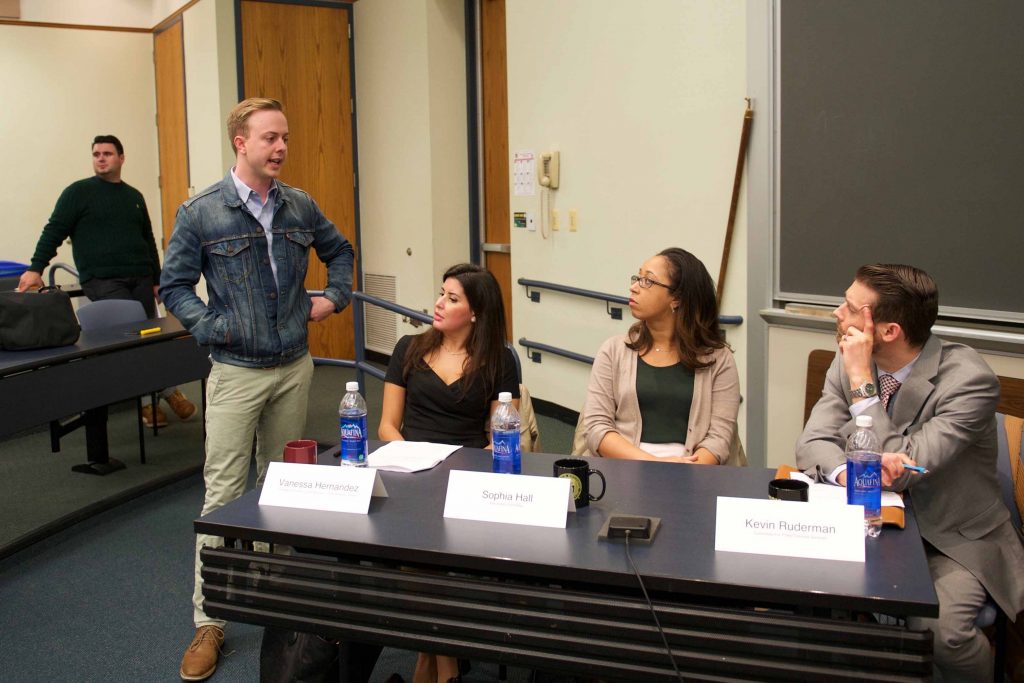Students gathered for a November event on careers in social justice were assured time and again by a panel of six practitioners that if there was an issue they were passionate about, there was a law job for them.
“If you can think of it, there is a firm, nonprofit, or agency that works on it,” said Sophia Hall, a staff attorney at the AIDS Action Committee of Massachusetts. “If not, then you can create that nonprofit or movement. The only thing that stops you from getting involved is you. The space is there. Look for an opportunity, or make one yourself.”
Organized by the BC Law chapter of the National Lawyers Guild, the event gave students a view of the kinds of careers available beyond big firms. “We wanted this panel to encourage students to imagine a vast array of possible careers and then think practically about how to build them,” said chapter president Daniel Edelstein.
The panelists spoke about their daily work, their passions, and how to find a career that brings the two together. They also discussed policy, holistic public defense for juveniles, and even transactional work, an area rarely associated with public interest.
Rahsaan Hall, director of the Racial Justice Project for ACLU Massachusetts, said his job centers on policy advocacy. His typical day revolves around meeting with influential policy makers rather than arguing before a judge, which is what he imagined in law school that he would do. Hall often gives testimony at the statehouse, relying on what he called the “soft skills” required to explain to elected officials how a policy affects their constituents.
The panelists seemed to agree that you might have to change your plans to find career that you love. “There were two things that I knew when I started law school,” said Vanessa Hernandez. “First, I knew I didn’t want to do criminal work, and second, I didn’t want to ever be in court.” However, she is now a public defender in the Youth Advocacy Division at the Committee for Public Counsel Services, and it is a rare day when she does not find herself in court. She got there by following the advice that she passed on to the BC Law students: Be open-minded and take as many clinics as possible. She was in a family law clinic when she fell in love with working closely with children. “With my clients, I cannot imagine the violence they see and the lives that they live. But I get to help them. What is better than that?”
Lynnise Pantin also thought she knew what she wanted to do with her law degree. “I was sure I wanted to be a judge,” she said. “I was going to be the next Thurgood Marshall.” Then she realized that the litigator’s life was not for her. Instead, as a clinical professor at BC Law, she operates the Community Enterprise Clinic where she shows students how public interest values and the transactional skills she honed in the private sector can work together. “Clinical teachers are the happiest,” she said. “The students are engaged, and I get to be there when they discover their calling.”
Panelist Barbara Dougan encouraged students to find ways to create meaning in their work. “A lot of great private practice lawyers are doing great social justice work alongside their bread and butter cases,” said Dougan, the Massachusetts project director at Families Against Mandatory Minimums and a member of the National Lawyers Guild. “The last decade has pulled back the cover on the criminal justice system and [exposed] how ugly it is,” she said. As she endeavors to reform Massachusetts’ drug sentencing, she engages with current prisoners and their families, using the communications skills she developed working on racial justice issues as a litigator. “You have to know what you don’t know,” she said. “You have to realize that you don’t know what it is like for your clients.”
“If you cannot talk with clients then you are not doing a good job,” said Kevin Ruderman, staff attorney and hiring coordinator at the Committee for Public Counsel Services, adding that zealous advocacy requires the ability to communicate well with other lawyers, parties, and judges as well.
Consistent commitment to clients or community is essential to a successful social justice career, the panelists said. “Even if it is only twenty minutes, what I give my clients is their time. I am here 100 percent for you in your time,” Sophia Hall explained. “Regardless of the issue, whether it is overcoming or managing substance abuse or understanding one’s identity, being respectful and committed, plus being the person you have committed to your clients to be, goes a long way.”
The dinner served at the career event conveyed a social justice message as well: the pizza and salad was provided by Dudley Dough, a new business in Roxbury dedicated to bringing local food and good jobs to the area. In addition to a living wage, employees receive a share of the profits the business makes every year.
LAMBDA, Themis Bar Review, and the LSA co-sponsored the event. The American Constitution Society and the Public Interest Law Foundation offered logistical support.


